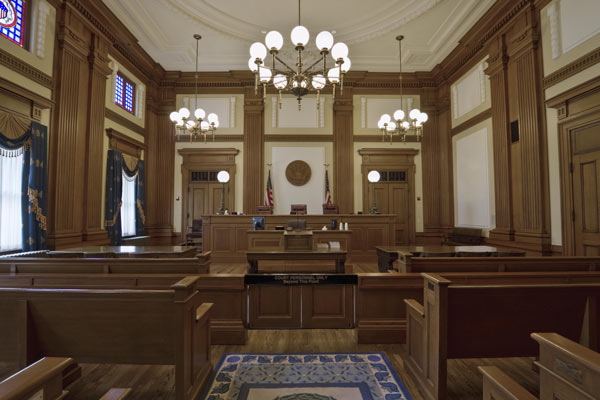I spoke with busy Philadelphia appeals attorney Todd Mosser, Esq. about what litigants and their attorneys can expect if they need to appeal a criminal matter in the federal court system. 
Unlike state courts, which are courts of plenary jurisdiction, federal courts are courts of limited jurisdiction in that they only hear matters involving violations of the U.S. Constitution and matters delegated by Congress. These are called “federal questions.” The following acts violate federal criminal law:
- Crimes on federal land or Indian reservations
- Crimes committed by one party upon another party from a different state
- Tax evasion
- Mail fraud
- Aircraft hijacking
- Carjacking
- Kidnapping
- bank robbery
- child pornography
- credit card fraud
- identity theft
- computer crimes
- hate crimes
- Employment discrimination
- RICO violations
- obscenity
- Counterfeiting
- Violations of the Espionage Act or the Patriot Act
- Illegal wiretapping
- electoral fraud
- Use of the mail for extortion or other illegal purposes
- assassination or attempted assassination of the U.S. President or Vice President
- Drug offenses if occurring across state lines or over national boundaries
- Bankruptcy crimes
Who Can Appeal a Conviction in Federal Court?
In general, a litigant can only appeal from a court order or final judgment. There are different types of appeal.
Appeal “As of Right”
When a statute or the constitution guarantees an appeal, it is an appeal “as of right,” meaning, the appellate court cannot refuse to hear the appeal.
In criminal matters, the State (the prosecution) has no appeal “as of right” when in a bench or jury trial results in the defendant’s acquittal. In some jurisdictions, if the indictment has been dismissed in whole or in part (usually as a result of the defendant’s suppression motion), the State can appeal “as of right” from that order.
A criminal defendant’s conviction in federal court is only final after it has been affirmed on appeal. For this reason, a criminal defendant may always appeal as of right.
Appeal “By Leave”
Where there is no appeal “as of right,” Defendant/Appellant may file an appeal “by leave,’ which means with permission of the appellate court. Permission is required when no statute or constitutional provision requires the appellate court to hear the matter.
The Issue being Appealed Must be ”Preserved” Below
At the trial, both the attorney for the defendant and the prosecutor must expressly object to an error that was overruled by the trial judge. If either attorney does not object, the issue is “waived” and cannot be overturned on appeal unless the error is “plain error.”
Can I Appeal if I Plead Guilty?
If you plead guilty you cannot appeal after you have been sentenced. Instead, you will need to make a motion to withdraw your plea. You will be required to prove that the plea was not voluntarily entered which can be very difficult. It is important to seek out the attorney who assisted during the trial to help with the motion.
Are there any risks in withdrawing a guilty plea?
If you succeed in withdrawing your guilty plea, it is most likely that the charges you were facing before you plead guilty will be brought against you again. This means that if you were facing higher or additional counts before you pled guilty, you will be facing those counts again and could be facing a longer sentence.
Types of Appeals
Direct appeal
In a direct appeal, the defendant-appellant files an appeal with the next higher court of review.
Again, a criminal defendant is always entitled to a direct appeal. The appellate court will use the record of the proceedings in the trial court to determine whether there were one or more errors causing the appellant to be convicted.
Issues raised on direct appeal include:
- The evidence does not support the verdict;
- Evidence was improperly admitted;
- Evidence was improperly excluded;
- The trial judge’s ruling(s) were erroneous;
- The trial judge erred in refusing to excuse a biased juror;
- The prosecutor improperly used voir dire to exclude certain people from the jury;
- The sentence was improper.
The error must have affected the verdict or the sentence in order for the appellate court to reverse or reverse and remand. This is called “prejudicial error,” as opposed to “harmless error” that, though it occurred, had no effect on the sentence or conviction.
No new facts or additional investigation may be admitted on direct appeal. This means that issues like ineffective assistance of counsel, prosecutorial misconduct, juror misconduct, or discovery of new evidence might need to be heard on collateral appeal.
Collateral appeal
These are usually filed after an unsuccessful direct appeal. The court is not required to hear such appeals – whether to hear them is at the court’s discretion.
The most common collateral appeal is called a Petition for Habeas Corpus, which is not, itself, an appeal. Literally meaning “produce the body,” a habeas corpus petition is filed by a criminal defendant to allege that he or she has been denied Constitutional rights to a fair trial, and thus is unlawfully imprisoned. If the judge finds that there is a reason to examine the imprisonment, he or she will issue a writ of habeas corpus. An application for a writ of habeas corpus must be filed within one (1) year of the conviction.
Other types of collateral appeal include:
- Motion for a New Trial (ineffective assistance of counsel, newly discovered evidence, et. al.)
- Motion to Void Contract Sentence (incorrect sentence)
Section 2255 Motion
This is a motion to vacate the conviction and/or sentence on constitutional, jurisdictional, or other legally fundamental grounds. A direct appeal is usually filed first.
Appellate Procedure
A Notice of Appeal must be filed with the clerk of court within 10 days of judgment or order entered, or the sentence entered. A briefing schedule is then set and the dates by which the appellant must order transcripts of the trial and submit the opening brief are set. “Continuances” are available if the court reporter is delayed in preparing the transcripts. Attorneys can also request an extension.
Briefs are limited to the record on direct appeals – no new evidence will be considered. Oral argument may be scheduled unless waived by both parties. The entire procedure may take a year to 18 months from the date of filing the notice of appeal.
The Federal Court System
A defendant whose trial took place in the U.S. District Court appeals to the U.S. District Court of Appeals, and from there applies for a writ of certiorari to appeal to the Supreme Court of the United States.
The Possible Results of a Criminal Appeal
Whether by right or by leave, an appeal will have one of the following results:
- Affirmed (sentence or conviction remain)
- Reversed (sentence or conviction are overturned)
- Vacated (sentence or conviction are vacated)
- Remanded (matter is heard again by the trial court with the appellate tribunal’s instructions)
Veronica Baxter is a blogger and legal assistant living and working near Philadelphia.
